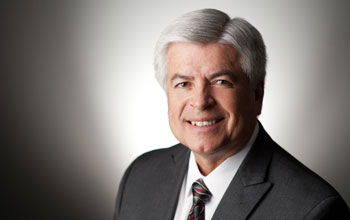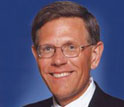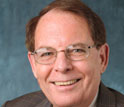News Release 12-094
New Leadership Team Elected for the National Science Board
Arvizu and Droegemeier to guide the NSB for the next two years; Lineberger to serve on Executive Committee

Dan Arvizu has been elected chairman of the National Science Board.
May 17, 2012
This material is available primarily for archival purposes. Telephone numbers or other contact information may be out of date; please see current contact information at media contacts.
At its May 2012 meeting, the National Science Board (NSB) elected Dan Arvizu as its new chairman, Kelvin Droegemeier as vice-chairman, and Carl Lineberger to serve on the NSB's Executive Committee.
Arvizu is director of the Department of Energy's National Renewable Energy Laboratory (NREL) in Golden, Colo. He was appointed to the Board in 2004 by President George W. Bush and was renominated by President Barack Obama after his initial six-year term ended. During his first term on the Board, Arvizu chaired the Audit and Oversight Committee and co-chaired the NSB Task Force on Sustainable Energy.
Arvizu has received numerous honors for his work. He was inducted into the Hispanic Engineer National Achievement Awards Conference Hall of Fame in 2008 and was named the Hispanic Scientist of the year in 2010 by the Museum of Science and Industry in Tampa, Fla. He has a Bachelor of Science in Mechanical Engineering from New Mexico State University and a Master of Science and Ph.D. in Mechanical Engineering from Stanford University.
"I am deeply honored to be selected by my peers as Chairman of the National Science Board," Arvizu said. "The board plays a vital role in setting national science policy, and in promoting science, technology, engineering and math education."
Droegemeier is Vice President for Research, Regents' Professor of Meteorology, Weathernews Chair Emeritus, and Roger and Sherry Teigen Presidential Professor at the University of Oklahoma at Norman. Droegemeier's research involves the dynamics and predictability of severe thunderstorms and tornadoes.
Droegemeier was appointed to the National Science Board in 2004 and reappointed in 2011. During his time on the Board, Droegemeier has chaired the Committee on Programs and Plans, chaired the Task Force on Cost Sharing, and co-chaired the Mid-Scale Research Task Force and the Task Force on Hurricane Science and Engineering.
He has chaired the Board of Trustees of the University Corporation for Atmospheric Research, serves on the NRC Board on Research Data and Definition, and serves on a numbers of other boards, including the Council on Governmental Relations. He earned a B.S. degree in Meteorology from the University of Oklahoma, and M.S. and Ph.D. degrees in atmospheric science from the University of Illinois at Urbana-Champaign.
The Board also elected W. Carl Lineberger to serve on its Executive Committee. Lineberger is the E.U. Condon Distinguished Professor of Chemistry and Biochemistry at the University of Colorado Boulder. His work is primarily experimental, using a wide variety of laser based techniques to study structure and reactivity of gas phase ions. Lineberger has published 250 papers in major scientific journals, and his graduate students and postdoctoral associates hold major research-related positions throughout the world.
Dr. Lineberger, appointed to the Board in 2011, currently serves on the National Research Council (NRC) Report Review Committee. He has previously chaired the NSF Advisory Committees on Mathematical and Physical Sciences and on the Science and Technology Centers. He recently completed service on the NAS Council, the NAS/NRC Committee on Science, Engineering and Public Policy, the NRC Governing Board, and the DOE Committee on New Science for a Secure and Sustainable Energy Future. Lineberger received his B.S., M.S., and Ph.D. degrees in Electrical Engineering from the Georgia Institute of Technology.
The NSB is made up of 25 Members appointed by the President and confirmed by the Senate. The NSF Director is an ex officio Member. Members serve six-year terms. With the exception of the NSF Director, one-third of the Board is appointed every two years. NSB Members are drawn from industry and universities, and represent a variety of science and engineering disciplines and geographic areas. The NSB is apolitical. The NSF Act of 1950, as amended, states that nominees to the "Board (1) shall be eminent in the fields of the basic, medical, or social sciences, engineering, agriculture, education, research management or public affairs; (2) shall be selected solely on the basis of established records of distinguished service; and (3) shall be so selected as to provide representation of the views of scientific and engineering leaders in all areas of the Nation."
-NSF-
-
Kelvin Droegemeier is the National Science Board's new vice-chairman.
Credit and Larger Version -
Carl Lineberger will serve on the NSB's Executive Committee.
Credit and Larger Version
Media Contacts
Maria C. Zacharias, NSF, (703) 292-8454, email: mzachari@nsf.gov
The U.S. National Science Foundation propels the nation forward by advancing fundamental research in all fields of science and engineering. NSF supports research and people by providing facilities, instruments and funding to support their ingenuity and sustain the U.S. as a global leader in research and innovation. With a fiscal year 2023 budget of $9.5 billion, NSF funds reach all 50 states through grants to nearly 2,000 colleges, universities and institutions. Each year, NSF receives more than 40,000 competitive proposals and makes about 11,000 new awards. Those awards include support for cooperative research with industry, Arctic and Antarctic research and operations, and U.S. participation in international scientific efforts.
Connect with us online
NSF website: nsf.gov
NSF News: nsf.gov/news
For News Media: nsf.gov/news/newsroom
Statistics: nsf.gov/statistics/
Awards database: nsf.gov/awardsearch/
Follow us on social
Twitter: twitter.com/NSF
Facebook: facebook.com/US.NSF
Instagram: instagram.com/nsfgov




